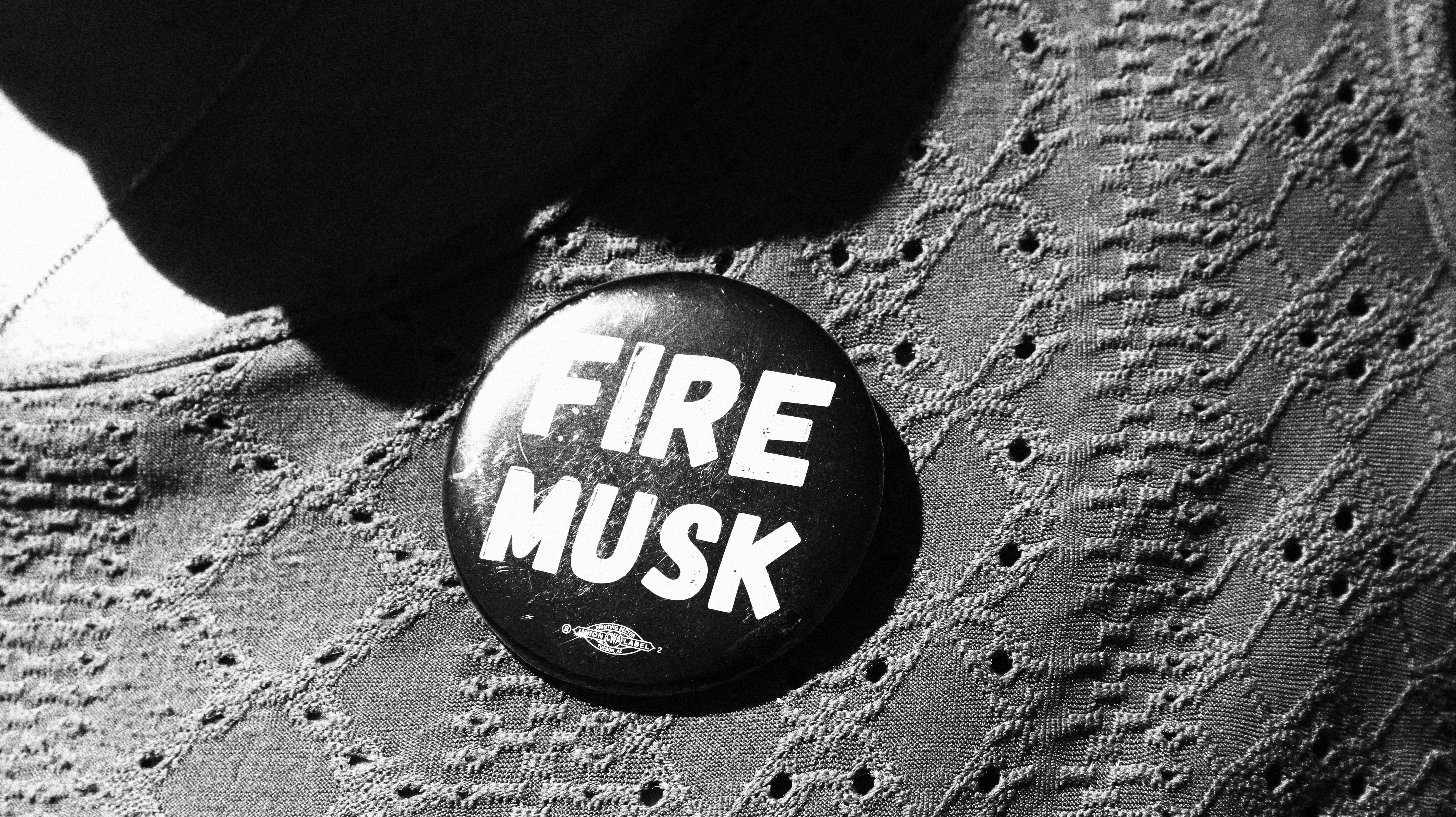“You’re Here Because of Your Tattoos”
On Friday, March 14, Arturo Suárez Trejo called his wife, Nathali Sánchez, from an immigration detention center in Texas. Suárez, a 33-year-old native of Caracas, Venezuela, explained that his deportation flight had been delayed. He told his wife he would be home soon. Suárez did not want to go back to Venezuela. Still, there was at least a silver lining: In December, Sánchez had given birth to their daughter, Nahiara. Suárez would finally have a chance to meet the three-month-old baby girl he had only ever seen on screens.
But, Sánchez told Mother Jones, she has not heard from Suárez since. Instead, last weekend, she found herself zooming in on a photo the government of El Salvador published of Venezuelan men the Trump administration had sent to President Nayib Bukele’s infamous Terrorism Confinement Center, or CECOT. “I realized that one of them was my husband,” she said. “I recognized him by the tattoo [on his neck], by his ear, and by his chin. Even though I couldn’t see his face, I knew it was him.” The photo Sánchez examined—and a highly producedpropaganda video promoted by Secretary of State Marco Rubio and the White House—showed Venezuelans shackled in prison uniforms as they were pushed around by guards and had their heads shaved.
The tattoo on Suárez’s neck is of a colibrí, a hummingbird. His wife said it is meant to symbolize “harmony and good energy.” She said his other tattoos, like a palm tree on his hand—an homage to Suárez’s late mother’s use of a Venezuelan expression about God being greater than a coconut tree—were similarly innocuous. Nevertheless, they may be why Suárez has been effectively disappeared by the US government into a Salvadoran mega-prison.
Mother Jones has spoken with friends, family members, and lawyers of ten men sent to El Salvador by the Trump administration based on allegations that they are members of the Venezuelan organized crime group Tren de Aragua. All of them say their relatives have tattoos and believe that is why their loved ones were targeted. But they vigorously reject the idea that their sons, brothers, and husbands have anything to do with Tren de Aragua, which the Trump administration recently labeled a foreign terrorist organization. The families have substantiated those assertions to Mother Jones, including—in many cases—by providing official documents attesting to their relatives’ lack of criminal histories in Venezuela. Such evidence might have persuaded US judges that the men were not part of any criminal organization had the Trump administration not deliberately deprived them of due process.
On March 14, President Donald Trump quietly signed a proclamation invoking the Alien Enemies Act—a 1798 law last used during World War II. The order declared that the United States is under invasion by Tren de Aragua. It is the first time in US history that the 18th-century statute, which gives the president extraordinary powers to detain and deport noncitizens, has been used absent a Congressional declaration of war. The administration then employed the wartime authority unlocked by the Alien Enemies Act to quickly load Venezuelans onto deportation flights from Texas to El Salvador.
In response to a class action lawsuit brought by the ACLU and Democracy Forward, federal judge James Boasberg almost immediately blocked the Trump White House from using the Alien Enemies Act to summarily deport Venezuelans, and directed any planes already in the air to turn around. But in defiance of that order, the administration kept jets flying to El Salvador. Now Suárez and others like him are trapped in the Central American nation with no clear way to contact their relatives or lawyers.
Suárez, whose story has also been reported on by the Venezuelan outlet El Estímulo, is an aspiring pop musician who records under the name SuarezVzla. His older brother, Nelson Suárez, said his sibling’s tattoos were intended to help him “stand out” from the crowd. “As Venezuelans, we can’t be in our own country so we came to a country where there is supposedly freedom of expression, where there are human rights, where there’s the strongest and most robust democracy,” Nelson said. “Yet the government is treating us like criminals based only on our tattoos, or because we’re Venezuelan, without a proper investigation or a prosecutor offering any evidence.” (All interviews with family members for this story were conducted in Spanish.)
“Well, you’re here because of your tattoos,” the ICE agent reportedly said. “We’re finding and questioning everyone who has tattoos.”
The Justice Department’s website states that Suárez’s immigration case is still pending and that he is due to appear before a judge next Wednesday. Records provided by Nelson Suárez show that Arturo has no criminal record in Venezuela. Nor, according to his family, does Suárez have one in Colombia and Chile, where he lived after leaving Venezuela in 2016. They say he is one of millions of Venezuelans who sought a better life elsewhere after fleeing one of the worst economic collapses in modern history. (Just a few years ago, Secretary Rubio, then a senator from Florida, stressed that failure to protect Venezuelans from deportation “would result in a very real death sentence for countless” people who had “fled their country.”)
The stories shared with Mother Jones suggest that Trump’s immigration officials actively sought out Venezuelan men with tattoos before the Alien Enemies Act was invoked and then removed them to El Salvador within hours of the presidential proclamation taking effect.
“This doesn’t just happen overnight,” said immigration lawyer Joseph Giardina, who represents one of the men now in El Salvador, Frizgeralth de Jesus Cornejo Pulgar. “They don’t get a staged reception in El Salvador and a whole wing for them in a maximum-security prison…It was a planned operation, that was carried out quickly and in violation of the judge’s order. They knew what they were doing.”

Arturo Suárez performing and speaking with his baby daughter from detention.Courtesy Arturo Suárez
The White House has yet to provide evidence that the hundreds of Venezuelans flown to El Salvador—without an opportunity to challenge their labeling as Tren de Aragua members and “terrorists”—had actual ties to the gang. When pressed on the criteria used for their identification, Press Secretary Karoline Leavitt pointed to unspecified “intelligence” deployed to arrest the Venezuelans she has referred to as “heinous monsters.” Trump’s border czar Tom Homan has insisted—without providing specific details—that the public should trust ICE to have correctly targeted the Venezuelans based on “criminal investigations,” social media posts, and surveillance.
Robert Cerna, an acting field office director for ICE’s removal operations branch, said the agency “did not simply rely on social media posts, photographs of the alien displaying gang-related hand gestures, or tattoos alone.” But Cerna also acknowledged that many of the Venezuelans deported under the Alien Enemies Act had no criminal history in the United States, a fact he twisted into an argument to seemingly justify the summary deportations without due process. “The lack of a criminal record does not indicate they pose a limited threat,” Cerna wrote. “In fact, based upon their association with TdA, the lack of specific information about each individual actually highlights the risk they pose. It demonstrates that they are terrorists with regard to whom we lack a complete profile.”
The relatives who talked to Mother Jones painted a vastly different picture from the US government’s description of the men as terrorists or hardened criminals. Many said their loved ones were tricked into thinking they were being sent back to Venezuela, not to a third country. (The Department of Homeland Security and ICE did not respond to a detailed request for comment asking for any evidence that the Venezuelans named in this articlehave ties to Tren de Aragua.)
Before leaving for the United States in late 2023, Neri Alvarado Borges lived in Yaritagua, a small city in north central Venezuela. His father is a farmer and his mother supports his 15-year-old brother, Nelyerson, who has autism.

Neri Alvarado with his brother Nelyerson in 2023.Courtesy María Alvarado
Alvarado’s older sister, María, stressed in a call from Venezuela that her brother has no connection to Tren de Aragua. She said her brother was deeply devoted to helping Nelyerson—explaining that one of his three tattoos is an autism awareness ribbon with his brother’s name on it and that he used to teach swimming classes for children with developmental disabilities. “Anyone who’s talked to Neri for even an hour can tell you what a great person he is. Truly, as a family, we are completely devastated to see him going through something so unjust—especially knowing that he’s never done anything wrong,” María said. “He’s someone who, as they say, wouldn’t even hurt a fly.”
Still, Alvarado was detained by ICE outside his apartment in early February and brought in for questioning, Juan Enrique Hernández, the owner of two Venezuelan bakeries in the Dallas area and Alvarado’s boss, told Mother Jones. One day later, Hernández went to see him in detention and asked him to explain what had happened. Alvarado told Hernández that an ICE agent had asked him if he knew why he had been picked up; Alvarado said that he did not. “Well, you’re here because of your tattoos,” the ICE agent replied, according to Hernández. “We’re finding and questioning everyone who has tattoos.”
The agent then asked Alvarado to explain his tattoos and for permission to review his phone for any evidence of gang activity. “You’re clean,” the ICE officer told Alvarado after he complied, according to both Hernández and María Alvarado. “I’m going to put down here that you have nothing to do with Tren de Aragua.”
For reasons that remain unclear, Hernández said that another official in ICE’s Dallas field office decided to keep Alvarado detained. María Alvarado said her brother told her the same story at the time.
Hernández spoke to Alvarado shortly before he was sent to El Salvador. “There are 90 of us here. We all have tattoos. We were all detained for the same reasons,” he recalled Alvarado telling him. “From what they told me, we are going to be deported.” Both assumed that meant being sent back to Venezuela.
Hernández, a US citizen who moved to the United States from Venezuela nearly three decades ago, searched desperately for Alvarado when he didn’t show up in his home country that weekend. He was nearly certain that Alvarado was in El Salvador when he first spoke to Mother Jones on Thursday. “I have very few friends,” he said. “Very few friends and I have been in this country for 27 years. I let Neri into my house because he is a stand-up guy…Because you can tell when someone is good or bad.” Later that day, on Alvarado’s 25th birthday, Hernández got confirmation that his friend was in El Salvador when CBS News published a list of the 238 people now at CECOT.
A centerpiece of Bukele’s brutal anti-gang crackdown, CECOT is known for due process violations and extreme confinement conditions. Last year, CNN obtained rare access to the remote prison, which can hold up to 40,000 people. The network found prisoners living in crowded cells with metal beds that had no mattresses or sheets, an open toilet, and a cement basin. Visitation and time outdoors are not allowed. A photographer who was allowed into the prison as the Venezuelans arrived earlier this month wrote for Time magazine that he witnessed them being beaten, humiliated, and stripped naked.
The Trump administration has indicated in court records that the El Salvador operation was weeks, if not months, in the making. In a declaration, a State Department official said arrangements with the Salvadoran and Venezuelan governments for the countries to take back US deportees allegedly associated with Tren de Aragua had been made after weeks of talks “at the highest levels”—including ones involving Secretary of State Rubio—and “were the result of intensive and delicate negotiations.”
As part of the deal, the US government will pay El Salvador $6 million to hold the Venezuelan men for at least one year. Calling the agreements a “foreign policy matter,” Rubio has claimed the outsourcing of deportees’ detention to Bukele’s “excellent prison system” is saving money for US taxpayers.
It is unclear if, or when, anyone sent to CECOT will be able to return to Venezuela. A Human Rights Watch program director noted in a declaration that the organization “is not aware of any detainees who have been released from that prison.” During an appeals court hearing on March 24, the ACLU’s lead counsel Lee Gelernt said, “We’re looking at people now who may be in a Salvadoran prison the rest of their lives.”

Neri Alvarado working at the bakery and the autism awareness tattoo with his brother’s name.
Courtesy María Alvarado
Joseph Giardina’s client Frizgeralth de Jesus Cornejo Pulgar thought he was set to return to Venezuela on a deportation flight. Carlos, Frizgeralth’s older sibling, said his 26-year-old brother called their sister, who lives in Tennessee, from the El Valle detention center in Texas. He said Frizgeralth told her he was going to be deported to Venezuela later that day. “He was happy that he was going to be here with us,” Carlos said from Caracas in a video call with Mother Jones.
But Frizgeralth never arrived. Eventually, the family heard from the girlfriend of another Venezuelan set to be deported on the same flight as Carlos. She had identified him in videos shared on social media of the men who had been sent to the prison in El Salvador. On March 19, Carlos started scouring the internet and spotted his brother in a TikTok video. In it, Frizgeralth has his freshly shaved head pressed down, a rose tattoo on his neck peeking out from under a white t-shirt.
“We felt very powerless and in a lot of pain,” Carlos said. “To see how they mistreat a person who doesn’t deserve any of that. It’s not fair.”
“I never imagined being imprisoned just for getting a tattoo.”
Frizgeralth arrived in the United States in June 2024 after crossing the Darién Gap and waiting several months in Mexico for a CBP One appointment. The Biden-era program, which the Trump administration has since terminated, allowed migrants to schedule a date to present lawfully at a US port of entry. Carlos said Border patrol agents let Frizgeralth’s girlfriend and their other brother, as well as two friends, through but they held Frizgeralth back. He ended up detained at Winn Correctional Center, an ICE facility in Louisiana.
In messages to his family from detention, Frizgeralth expressed concern he was being investigated because of his tattoos. He explained that none of the 20 or so images—including one on his chest of an angel holding a gun—he has tattooed on his body have any connection to gang activity. He also described feeling discouraged from hearing stories in detention of Venezuelans who had recently been redetained and said ICE agents picked them up over suspicions about their tattoos.
Frizgeralth even had a declaration from his tattoo artist confirming the harmless nature of the artwork. “I never imagined being imprisoned just for getting a tattoo,” Frizgeralth, who owns a streetwear clothing brand with Carlos, wrote. “I never imagined being separated from my family. I wouldn’t wish this on anyone, not even my worst enemy if I had one. It’s horrible, it’s mental torture every day.”
Like Suárez and Alvarado, Frizgeralth had no criminal record in Venezuela, documents show. Giardina said his client also had no known criminal history in the United States. Nor did he have a final deportation order. During his preliminary court hearings, the US government never claimed or presented evidence that Frizgeralth had ties to Tren de Aragua. “He was doing everything he was supposed to do,” Giardina said. “He got vetted and checked when he came into the country. He was in detention the entire time. It’s insanity.” If anything, Giardina said, his client had a strong claim for asylum based on political persecution. He said Frizgeralth was being targeted by the colectivos, paramilitary groups linked to the Maduro regime.
About a week prior to his deportation, they moved Frizgeralth to Texas. His next hearing, which is scheduled for April 10, still appears on the immigration court’s online system. “To detain them in this maximum security prison with no access to lawyers, no charges, just because you’re saying they’re terrorists…,” Giardina said. “I mean, what the hell?”
Génesis Lozada Sánchez said she and her younger brother Wuilliam are from a rural Venezuelan “cattle town” called Coloncito near Colombia. Following Venezuela’s economic collapse, both she and Wuilliam lived in Bogota, where her brother saved up for the journey to the United States by making pants at a clothing factory. After he reached the border last January, Wuilliam was detained for more than a year, Génesis said.
On Friday, March 14, he called a cousin in the United States to say that he was about to be deported to Venezuela. “But to everyone’s surprise, that’s not what happened. They were kidnapped,” Génesis said. “Why do I say kidnapped? These people have no ties to El Salvador. They haven’t committed any crimes there. And they’re not even Salvadoran. They don’t even cross into El Salvador after going through the Darién Gap on their way to the United States. So, it’s a kidnapping. They tricked these guys into signing papers by telling them they were being sent to Venezuela.”
Like other men sent to El Salvador, Wuilliam has tattoos. But Génesis said that they have nothing to do with Tren de Aragua and that her brother has no criminal record. His goal had been to make enough money in the United States to help support their parents and to save up enough to hopefully open a clothing factory back home.
Other reporting and court briefs further support the families’ suspicions that their loved ones were primarily targeted for deportation because of their tattoos. In one instance, a professional soccer player, whose attorney said had fled Venezuela after protesting against the Maduro regime and being tortured, was accused of gang membership based on a tattoo similar to the logo of his favorite team, Real Madrid.
John Dutton, a Houston-based immigration attorney, said that he started noticing ICE officers detaining Venezuelans during check-ins due to their tattoos earlier this year. “If they notice they have a tattoo, they’re just taking them into custody,” he explained. “No more questions to ask.” Dutton estimated he now has about a dozen clients who have been arrested because of tattoos.
One of his clients, Henrry Albornoz Quintero, was due in court for a bond hearing last Wednesday after being taken into detention at a routine ICE check-in. “I show up. The judge asked me where my client is,” the Houston lawyer said. “I asked the same question to the DHS attorney. She looked at her notes, shuffled papers around as if she’s gonna find the answer in there, looks up, and said, ‘Judge, I don’t know.’”
Dutton told the judge that his client might be in El Salvador; his relatives had recognized him in one of the images of people at CECOT. The judge then decided not to hear the case on the grounds that he no longer had jurisdiction. “You could tell he wanted to help me,” Dutton added. “He just couldn’t. There’s nothing he could do.”
The next day, Albornoz’s name appeared on the list of people imprisoned in El Salvador. So far, Albornoz is the only one of Dutton’s clients to be sent there. His wife is nine months pregnant with their first child.
“They didn’t just deport these people and then set them free,” says Ilya Somin, a law professor at George Mason University. “They sent them to El Salvador, where that country, at the behest of the United States, is incarcerating them for at least a year in their prison system. This is not just deportation without due process. This is imprisonment without due process in a foreign prison system that has terrible conditions. That’s a pretty blatant violation of the Fifth Amendment’s due process clause, which says that you can’t take away people’s life, liberty or property without due process of law.”
Until Thursday, March 20, Barbara Alexandra Manzo still wasn’t sure if her brother Lainerke Daniel Manzo Lovera was among those sent to El Salvador and transferred to CECOT. The family hadn’t heard from him since that Saturday, when he called from El Paso, Texas, to say they were deporting him to Venezuela or Mexico. Her confirmation also came when she saw his name on the CBS News list.
Barbara Alexandra told Mother Jones that Lainerke didn’t even have a tattoo before he left Venezuela in December 2023. He got one—a clock on his arm—while living and working in Mexico, waiting for a CBP One appointment. It was a gift from a roommate who had been given a date before he did. Last October, Lainerke showed up at the border and was sent to ICE detention; first in San Diego, then briefly in Arizona. He had a court hearing scheduled for March 26.
“My son went to look for a better future, the American Dream,” his mother Eglee Xiomara said in a video. “And it didn’t come true. That was the worst trip he has ever made in his life.”
Lainerke has yet to meet his six-month-old daughter, who was born in the United States. “He’s never been in prison,” Barbara Alexandra said. “[We’re wondering] if he’s ok or if something is happening to him. And we’ll never know because we have no recourse.”
Nelson Suárez fears that he, too, could meet the same fate as his brother Arturo, the Venezuelan musician. Even during the first Trump administration, the fact that Nelson has Temporary Protected Status and a pending asylum case would have been enough to protect him from deportation. But there are no guarantees that it will be now. If Judge Boasberg’s temporary restraining order is lifted or overturned, he could be immediately deported to Venezuela, or sent to El Salvador, without due process. He doesn’t know if he will walk out of a scheduled check-in with ICE in May free or in chains.
“I’m really scared,” he said last week. “My three daughters are here with me. My wife is here. My kids are in school. I don’t know what could happen. Since this happened to my brother, I really haven’t been able to sleep. I have no peace, no sense of calm. I’m afraid to go out on the street. But at the same time, we have to go out to work and get things done.”
Continue Reading…



 (@yashar)
(@yashar) 





